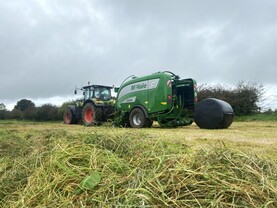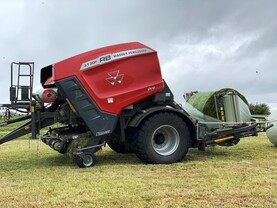Every year, more and more of Scotland’s arable ground is run on contract, with farmers letting out their land for others to grow crops on. The attraction of farmers being able to run arable units when scale and cost makes it prohibitive, is driving change in the countryside.
The usual arrangement appears to be that the landowner will receive the support payment; for region one this will be about £65-70 an acre. On top of this, agreements vary from no additional payment to the landowner, to up to £3/t to £4/t of barley or wheat being common. It is also popular for the landowner to receive the straw.
The key to successful contract farming is farming for the long term. This will prevent increasing wild oats and couch grass, along with maintaining investment in lime and drainage.
Contract farming in action
Lee Walker farms 170 acres on Whitestripe farm, near Strichen.
“I use a contract farmer for my cereals. Due to my health and the cost of replacing equipment it just isn’t feasible to do the work myself. I have detooled the farm to a certain extent. A neighbour grows the crop for three to five years on about 50-60 acres, as part of a rotation with grass.
“It has always been the same neighbour who has been doing it for about five years. I put in the long-term inputs and he puts in day-to-day management. His agronomy is good, as we both farm the land for the long term. My advice for anyone in the similar position is to make sure you choose who you work with. I am lucky that the man I work with wants to farm as well as I would myself. Don’t always go for the highest bidder. We both share the risk.
“I am cereal assured and I take the subsidy, so the three-crop rule applies as I am 68% grass, just under the threshold.”
Andrew Moir contract farms without owning or renting any land in his own right near Laurencekirk.
“Contract farming is a good way for new and younger farmers to get into the industry who don’t have land. Trust is absolutely key to making it work.
“The downside is that investment in cash and machinery can leave the contractor vulnerable if the agreement with the landowner finishes. But most contractor farmers also have substantial farms which they own or rent in their own right
“People should not get too negative about not having the money to buy or rent land. It doesn’t necessary need to be youngsters getting into the industry, I was 50 when I went on my own. The Government should be helping a bit more to give confidence for new farmers and landowners to help people farm.
“Landowners need to remember that once a sub has gone, it still costs the same to run the farm and it can’t be the contractor.”






 This is a subscriber-only article
This is a subscriber-only article









SHARING OPTIONS: